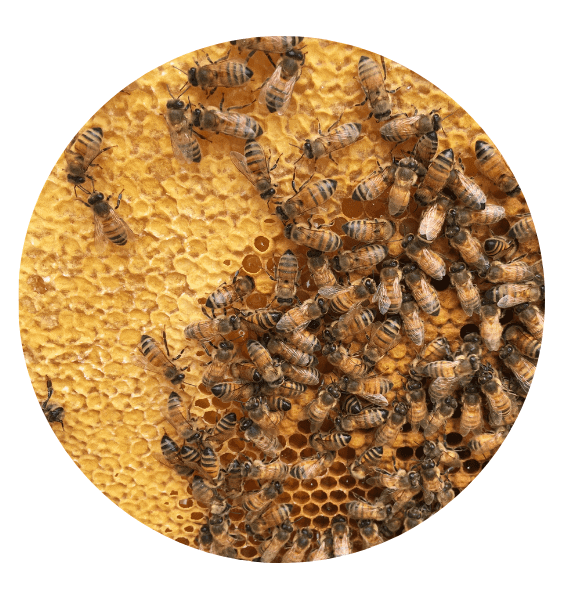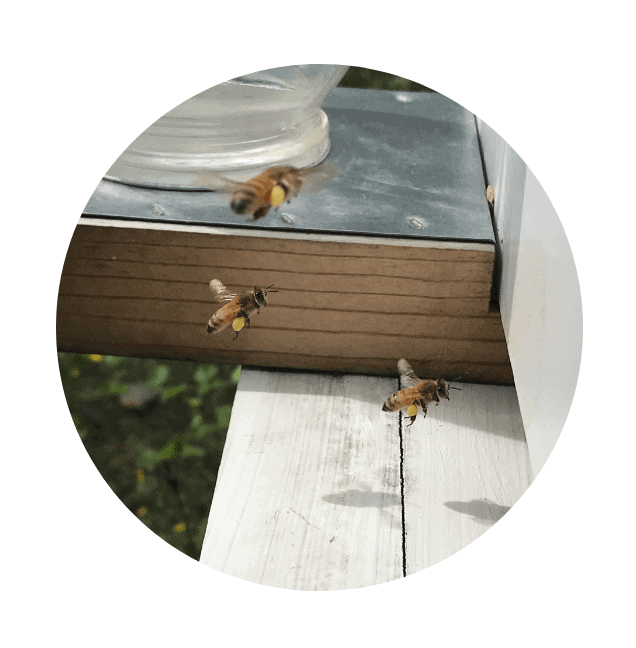 Mo-Ranch is now proudly the humble abode to four colonies of honey bees. We recently added three hive boxes—two that are located in the wildflower field across from Wynne and Flato Lodge and one tucked away behind the Riverview Classroom. We also maintain an observation hive in the Riverview Classroom which allows students to see the bees creating honey and maintaining their hive!
Mo-Ranch is now proudly the humble abode to four colonies of honey bees. We recently added three hive boxes—two that are located in the wildflower field across from Wynne and Flato Lodge and one tucked away behind the Riverview Classroom. We also maintain an observation hive in the Riverview Classroom which allows students to see the bees creating honey and maintaining their hive!
In our Riverview Classroom, children learn about the organizational structure of beehives and the daily aspects of a bee’s life. Each colony has only one queen bee, and she will have a productive lifespan anywhere between two-to-four years. She is the one that leads the colony, and she lays the eggs that produce new bees and has the astounding capability of laying 2,000 eggs a day if needed. The queen also decides how many bees there will be and whether the bees will be drones or worker bees.
The queen bee never leaves the hive, and her attendants take care of her basic needs while she tirelessly lays eggs throughout the hive. The drones are male bees that spend almost all their time in the hive, and their main job is to mate with and protect the queen. Worker bees are female bees that you will typically see around flowers and blooming plants. These worker bees do have stingers but will only sting when provoked. Worker bees are a critical part of the hives’ success, and their main job is to work for their hive. These bees collect pollen and nectar, build comb inside the hive, make and cap honey, nurture the newly hatched bees, care for the queen and clean up debris within the hive.
During the spring and summer months, our busy worker bees live approximately four-to-six weeks. Flowers are blooming, and nectar is flowing during these months, so the worker bees are very busy and therefore don’t live long. In the fall and winter months, the worker bees will live four-to-five months. Bees are incredibly important to the continuation of our food supply—they are the primary pollinators of our crops.
Beekeeping provides an incredibly positive ecological and environmental impact; now more than ever, bees are in great danger of being exterminated. Keeping bees provides a safe place for the bees to live on the ranch. At Mo, our flowers and trees benefit from the bees’ pollination techniques. The bees are an important new educational opportunity for our Outdoor Education Ministry (OEM) classes and teach children about how our environment and food supply processes work. Students in our OEM classes can experience a rare, up-close view of what occurs in the day-to-day life of a beehive. 
Kathy Anderson, our director of programs, is the faculty touchstone for our current beekeeping success and future endeavors. She would like to see the program expand and is pursuing grants that are focused on bees and beekeeping from an educational standpoint. Through her passion and beekeeping experience, Kathy and Mo are creating a bright and expansive future for our bees as well as our guests. Through our beekeeping initiative, we are hoping to create more knowledge and understanding around bees as well as their precious position in our ecological system.


